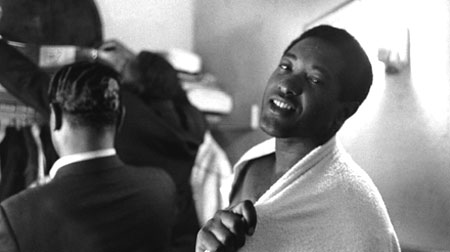He had a silky voice and good looks; he was charming and brazen. Doors opened for him, bringing his unique gospel — “Good News,” “Wonderful World,” “You Send Me,” “Change Is Gonna Come” and more.
Cooke put the spirit of the black church into popular music, creating a new American sound and setting into motion a chain of events that forever altered the course of popular music and race relations in America. With “You Send Me” in 1957, Cooke became the first African-American artist to reach #1 on both the R&B and pop charts. It was risky for this young gospel performer to alienate his fans by embracing “the devil’s music” — but he proved, with his pop/gospel hybrid, that it was, indeed, possible to win over white teenage listeners and keep his faithful church followers.

Sam Cooke
Sam Cooke accomplished what no other black performer had ever even attempted, founding his own music publishing and record label, opening doors for and writing material for other artists — mentoring Aretha Franklin and launching Otis Redding. He had the courage to take an open stand against racism, refusing to perform at a segregated venue in the South and garnering the support of Dick Clark. His story ends abruptly at the height of his success when, at the age of 32 in 1964, he was, inexplicably, gunned down and killed in the company of a prostitute, leaving a profound legacy filled with extraordinary talent — and all the questions about what might have been.

By submitting your comments, you hereby give AZPM the right to post your comments and potentially use them in any other form of media operated by this institution.